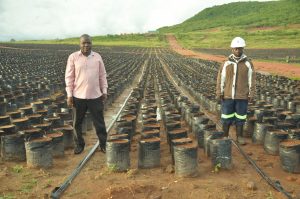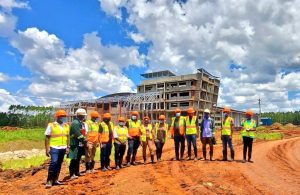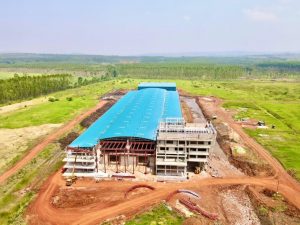
Farmers in Buvuma applaud oil palm project
By Sierra Ruth Arinaitwe Joyce Namusobya has been a subsistence farmer based in Bukagali village on Buvuma Island for as long as she can remember, using her land to grow food for consumption. She couldn’t even utilize all the land she had. She didn’t know what to do with most of her land. That is however set to change. “I recently sold part of my land, receiving Shs17 million for two acres as a compensation from the National Oil Palm Project,” she says. “I used the money to buy another piece of land elsewhere and also bought cattle to diversify my income and also get some organic manure,” she explains with a measure of pride in her voice. Namusobya isn’t a lone figure on this island with such a story. Nasim Nangobi, a farmer in Kikongo village, says that she was paid Shs7 million for her three acres of land. “I used the money to buy another piece of land for myself,” she says. “We have been growing food crops just to eat at home. But by growing oil palm, we are going to be able to make some money and live better lives. We have been educated that if you own some land, it is wise to use some of it for oil palm growing and the rest for food crops like maize as we have always been doing,” she said. For the first 3-4 years before oil palm trees are ready for harvesting, farmers like Namusobya and Nangobi could actually utilize 100% of their land for food production through intercropping. “Intercropping ensures that farmers have food as they wait for their harvests. Once the harvests come in and as oil palm trees mature, then they have money to use to pay for their other needs,” explains Wilson Serunjogi, a farmer and the sub country chief of Nairambi in Buvuma. Charles Kalule, another farmer in Bukagali village concurs. “My land was surveyed to establish the acreage after I had been sensitized and agreed to sell some of it for the oil palm project. After I agreed to the value, I was advised to open a bank account where my money will be deposited,” he explains. When Kalule receives his money, like other sellers he will also get 30% on top of the value of his land as a disturbance allowance. “I am going to improve and uplift my family’s standards of living by building a better house and use the rest to improve my income,” he says. It is not only farmers who have sold land that will benefit from the project. Many youths are already employed in the nursery bed on four hectares where 1,944,000 seedlings are being prepared for planting this rainy season. Today, 154 people majority of whom are residents of Buvuma Islands are employed by the nursery bed. “We have the alternative livelihood programme that we are implementing in Buvuma where we are imparting residents with other skills. We know that not everyone will be working directly in the oil palm project,” Connie Magomu Masaba, the Project Manager of the National Oil Palm Project explains. Oil palm growing in Buvuma will be established on just one island out of 54 utilizing approximately 7,500 hectares out of more than 22,000 that constitute this particular island leaving the rest of the land for food production among other activities. In Kalangala, the first area where commercial oil palm growing has been established, smallholder farmers’ incomes have grown significantly since they collectively earn approximately Shs2.9 billion every month. Oil palm trees are perennial crops which take 3-4 years to mature after which they are harvested every 10 days for 25 to 30 years thereby providing steady monthly income to smallholder farmers. They yield 8-10 times more than other vegetable oil crops such as sunflower and soybean. This means oil palm provides more returns on investment to farmers than many other vegetable oil crops. Following that success in Kalangala, NOPP under the auspices of the Ministry of Agriculture, Animal Industry and Fisheries (MAAIF) with funding from International Fund for Agricultural Development (IFAD) decided to expand oil palm growing to other areas starting with Buvuma with an aim of rural transformation. To that effect, NOPP has been able to compensate over 7,400 tenants and landlords so far. Compensations continue as more willing sellers come on board after the ongoing sensitizations and land valuations. The RDC of Buvuma Godfrey Tilutya described this development as a “golden opportunity” which is going to transform Buvuma. “The project has already started creating employment opportunities and income generating opportunities for the residents of Buvuma. The people of Buvuma are going to benefit further as in the long run, the project comes along with better roads, improved health centers, better schools, and guest houses are going to be built which will lead to economic development of our area,” he said.


